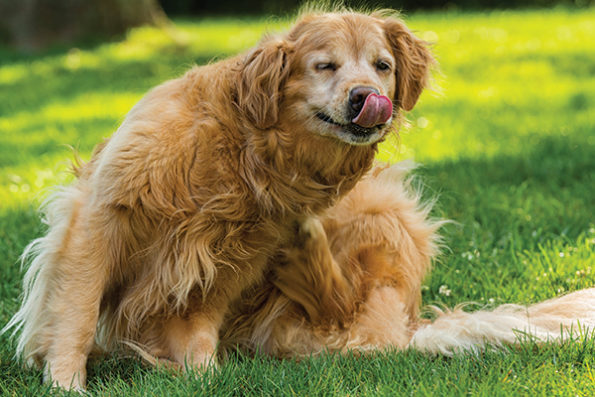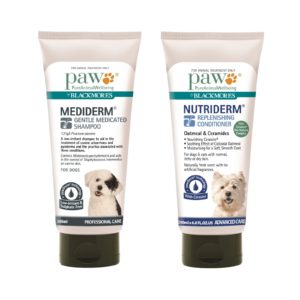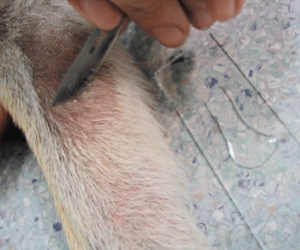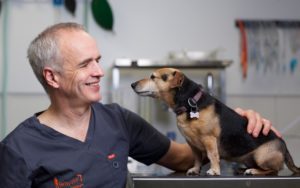
Skin allergies in dogs are one of the most common reasons owners take their dogs to see a vet.
There are many differential causes for skin irritations, redness, hair loss, scabs etc and for a dog to bite, chew or scratch itself. Some of these may include parasites e.g. fox mange (sarcoptes), bacterial, fungal or yeast infections. Hormonal issues e.g. Hyperthyroidism or Cushing’s disease can cause hair loss, redness or skin changes.
Clinical signs
The end clinical signs can appear very similar irrespective of the causative agent and immune response to it. The clinical signs could include some or many of:-
- Itchiness- the most common thing the owner notices. This may involve ears, feet, armpits, groin, and face. The dog may lick, scratch or chew at its skin.
- Redness- the skin may become red (inflammation) or if chronic, may develop dark pigmentation
- Scabs and scales- there are many reactions from a pimple to scabs, crusts, secondary excoriation (self trauma)
- Hair loss, odour (especially ears), thickened skin
There are some broad categories of skin allergies which include-
- Fleas– flea allergy dermatitis (FAD)- This occurs when a dog develops a sensitivity to the allergens in the saliva. The common distribution is just around or on the tail and forward of the tail, on the back or down the back of the legs.
Treatment and prevention involves-
a) cortisone to control the itch
b) “Capstar” to kill adult fleas at once
c) A product prevent fleas on the dog. These are available in tablet or “spot-on” form. - Atopy– this is an inherited immune disorder that overreacts to allergens and can may affect up to 10% of dogs. These allergens may be inhaled or absorbed through the skin. Disposed breed include- west highland terriers (westies), Labrador retrievers, poodles, setters and other breeds. Cross breeds can also be atopic.
It may begin as a seasonal skin event e.g. spring, summer, but can develop where it is present all year round. Thus it can initially be sensitivity to one allergen but the immune system overreacts to many allergens.The allergy may be pollens, grasses, house mites, feathers, moulds etc. - Food allergies– the skin develops hypersensitivity to the protein or food components in the diet
Up to 20% of all allergies may be food related.
The causative allergen may be a protein that is in the dogs normal diet e.g. beef protein.
The only way to discover the causative food protein is with an elimination diet. This is where a suspect food e.g. beef is not fed in any manner for 6 to 8 weeks and gauge the response in the skin of the dog
- Contact allergies– this is where we get direct hypersensitivity to allergies contacting the skin. This involves a transdermal reaction with the allergen reacting with a pre-existing antibody in the dermis. The culprit can be weeds, e.g. wandering dew, or what ever grasses are in the environment
Diagnosis:
Allergies are very complex diagnostic examinations. In many cases, bacterial infections, self trauma, yeast can change the appearance of the skin.
The vet may do skin scrapes, smears, cultures to check for mites, yeasts or bacterial infections.
Specific allergen tests are complex. They can be run as intra-dermal (patch testing) or as a blood test.
Often a presumptive diagnosis is made once the causes are eliminated which is often a controlled case of trial and error.
Treatment:
Treatments can vary with each individual and their diagnosis.
- Cytopoint injections may be an option which will be discussed with your vet. These are often advised to be every 4-8 weeks, depending on how well the animal responds and are only available through consultation
- Cortisone can be used singly or in combination as topical (cortavance), ointments or oral tablets
- Medicated washes e.g. malaseb or Nutriderm, will treat any bacterial or yeast infections on the skin
- Omega 3/6, fatty acid supplements may assist with some anti-inflammatory action
- Dietary- we may use low allergenic diets
- Clipping the coat, bathing to remove scales or scurf, skin hydration or misty spray

The best way to treat your dogs skin, is with a complete check up with your vet. Call us today to book your appointment (03) 54282805




